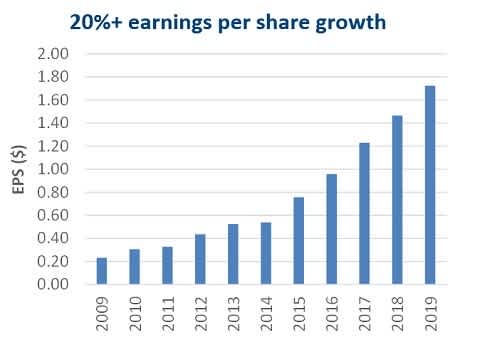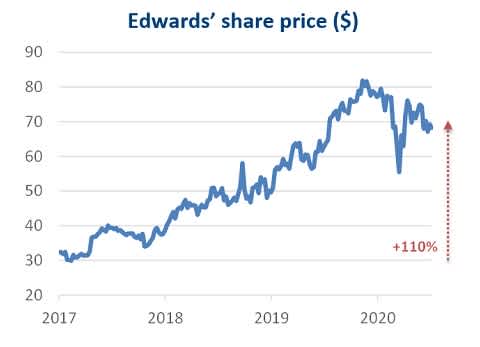The way in which your Kiwisaver provider invests your hard-earned savings will have a significant bearing on your long-term financial security. In Part 1 of this newsletter series we introduced Fisher Funds’ unique investing style and how it helps clients meet their financial goals. In the rest of this series we delve deeper into the specifics of our investment style and how we invest. We are continually seeking to identify a select group of businesses that have sustainable competitive advantages (moats); talented and incentivised management teams; and underappreciated growth runways. Today we turn our attention to why backing the right management team is so important when investing.
Short-term share market investors often don’t spend much time researching and meeting with the management teams. After all, if you are only planning to invest for the next few months, then how much damage can management do? Umm…heard of Enron?
Needless to say, we think this is a bad approach. Not only does having a capable, aligned and honest management team help mitigate investment risks, it also has a significant positive influence on long-term value creation as we discuss below.
The business world is constantly changing. New technologies are developed, new threats and competitors emerge, and new avenues for growth present themselves. The decisions that management make in the face of these changes can have a significant impact on shareholder returns – for better or worse. The chart below that Bain & Co created a few years ago illustrates this well. It shows that listed founder-led companies in the US outperformed the S&P 500 Index dramatically between 1990 and 2014. This reasons why are clear.

Management getting it wrong
Examples of poor management and short-term thinking seriously harming businesses are unfortunately not that hard to find. Just think about the decisions by many global banks in the lead up to the global financial crisis. Many kept lending to people and businesses that couldn’t afford it and sold products to clients that they didn’t understand. Citigroup’s CEO Chuck Prince was quoted in 2007 saying “as long as the music keeps playing, you’ve got to get up and dance”. Well dance they did, clipped some nice bonuses along the way, until their banks collapsed and they lost most of their shareholders money. Poor management and a lack of integrity can have serious consequences.
General Electric is another recent example. While they own some good businesses (particularly in jet engines and healthcare), management’s focus on growth at all costs over the last 20 years has cost them dearly. In order to grow, management went on a buying spree of epic proportions, acquiring businesses in areas from oil field services to wind power, 3D printing and medical devices. These acquisitions, combined with years of share buybacks that they couldn’t really afford, pushed debt to unsustainable levels. They are now in fire-sale mode and its share price has fallen from $30 in 2016 to close to $7 today - wiping out over $200 billion in shareholder’s savings. Don’t worry about management though, CEO Jeff Immelt who ran the business from 2001 to 2017 is estimated to have earned well over $200 million during his career at GE…
Management getting it right
Unfortunately there are far fewer examples of management teams that have added significant value. But these management teams do exist and can create a lot of wealth for shareholders.
An obvious example of these qualities would be Jeff Bezos at Amazon. Bezos has always focused almost exclusively on building a business for the long term, by focusing on customer experience over and above short-term profits. Instead of trying to maximise profitability once they had dominated the online book retail business, Bezos decided to reinvest these profits to move into other commerce categories, build Amazon’s fulfilment capabilities, and offer faster delivery than competitors. Likewise, they have reinvested the profits from their cloud business AWS and Prime subscriptions to continually offer faster and then eventually free delivery. This has created incredible customer loyalty, rapid growth, and an unassailable lead in ecommerce.
Edwards Lifesciences’ focus on heart valve innovation has paid dividends

Our portfolio company Edwards Lifesciences is another great example of how value can be created by an aligned and long-term focused management team. Edwards is the world’s leading manufacturer of replacement heart valves and a pioneer in the area of heart valves that can be implanted without open-heart surgery (via catheter). This technology is great from the patient’s perspective as it removes the need to have complex and high-risk surgery, and often allows patients to leave hospital the next day. It can also save hospitals money due to shorter patient visits and fewer complications. While only a fraction of patients are currently treated this way, Edwards has a long term vision that this will become the standard of care for all patients.
In order to ensure this vision becomes a reality Edwards management, lead by CEO Michael Mussallem, has continually invested in research and development to improve its existing valves and to build a base of clinic evidence to support the adoption of its devices. Edwards is the largest player in the industry and spends 17% of its revenue each year on R&D. This means they invest significantly more than their nearest competitor in innovation and new products. As a result, Edwards has continually strengthened its competitive position and has been extending its growth runway beyond products for the aortic valve, and into new devices to repair the tricuspid and mitral heart valves. We also like that management is heavily invested in the company, with CEO Michael Mussallem holding over US$200 million worth of Edwards shares.
We had the opportunity to invest in Edwards in early 2017 when the market became despondent with a short-term slowdown in sales growth, rather than focusing on the large long-term opportunity. Edwards’ share price has more than doubled since then and we believe this provides a good example of how the market occasionally provides opportunities to investors willing to look through short-term noise and back the right.


Edwards is a great example of how management with skin in the game and a willingness to invest for the long term can create a lot of value for investors. It highlights the importance of an aligned management team, which is one of the three key characteristics we look for in a business.

